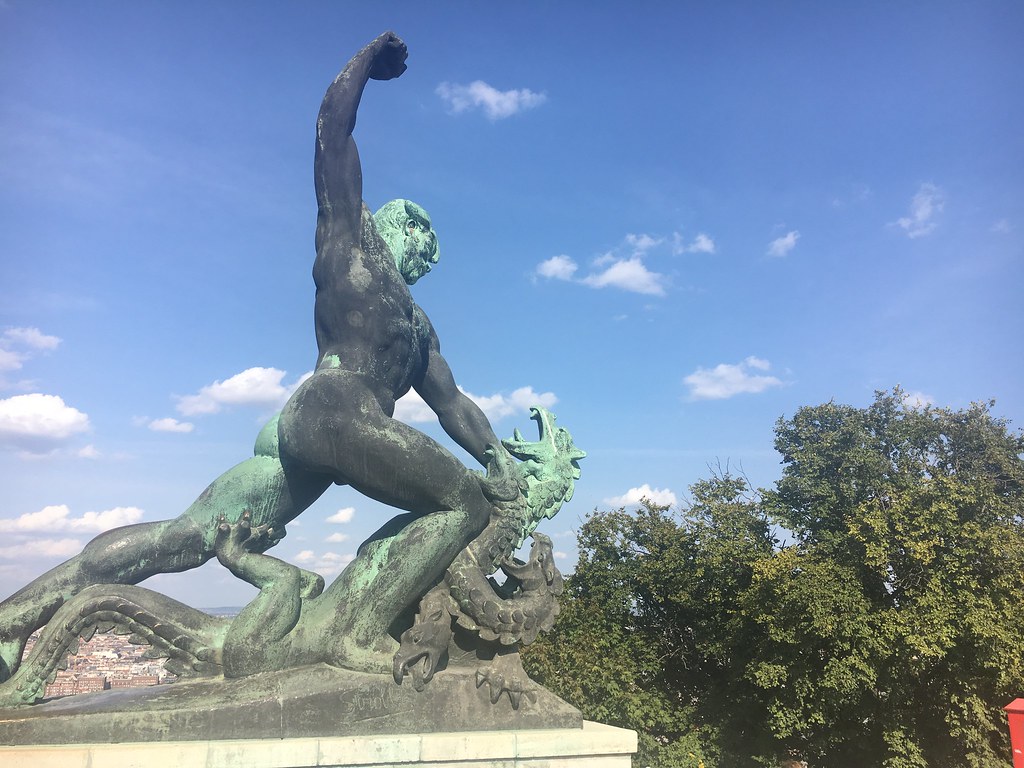My first morning in Budapest started uneventfully ... a step across the road to the bakery and then a stroll around the neighbourhood, looking for a leafy, sunny spot with wifi. Most of the tables in the park are taken. There is a table of men and women talking. At another table four men sit drinking bottles of beer. It's 11AM on a Tuesday morning and judging by their neat clothes, they could be on their way to (or from) work.
I looped back to my Airbnb. The apartment staircase within the private courtyard was my best Wi-Fi and tea spot. And so I sat for probably a good hour journalling, tapping on my phone. Neighbours came and went on the opposite stairs. Then an old, fat, moustachioed man with a yellow shirt came to talk to me. I don't speak Hungarian, I said.--Francais?
Yes.
-- What you are doing there doesn't work. And he gestured for me to leave the premises. I'm not blocking his path. He thinks I'm trespassing.
"I'm sleeping here, at my friends house."
He kept telling me that I had to leave.
"I am invited, you can't uninvite me." I said.
Fat man asked to speak to the resident of the house, but my host is out.
"There is no problem," I said.
" Passport please," he said with an outstretched hand.
"Who are you?" I said "You are not the police."
Fat man got his phone out. He was calling the police. I turned my attention back to the internet and my cup of tea.
Within maybe 30 minutes, two young police officers found their way into the private courtyard. They were polite, and one of them spoke good English. They asked me what I was doing. Using Wi-Fi, I said, showing them the Wi-Fi symbol on my phone.
"We understand."
"I'm staying here with a friend, I have the keys to this house" ...and I showed them. I got up from the step and turned the key in the lock. Surely the matter should end here. I sat down again.
But no. They asked me for identity. I reached into my bag and handed them my Australian drivers license. One officer stood below me, the other, looking down on me. They held the drivers license for a while, studied it. They asked my nationality. I said Australian, European. They asked for my passport.
"Why? You have my ID." They held the drivers license for a while more, referred to their phones. "There may be a crime happening somewhere," I said. "But not here." They mulled over my drivers license a while longer.
"Documents please."
I'm getting annoyed now, but keep a calm tone of voice. "This is private property. I am a tourist. In one week I will be gone. What is the problem?"
"Can we see your passport?"
"Is there a crime? Why do you want my passport?"
"I am a police officer. It's just a check."
Very miffed but unsure of my rights in this country, I finally went inside to fetch my EU passport saying, "You stay here. This is going to be a very exciting day for the police. They are going to find a European citizen in Europe."
Inside the passport was my boarding pass stub, showing I had been in the country less than 24 hours. The English-speaking officer said "Thank you. We came because someone saw you sitting here and called us to come and check."
I said "Maybe he is wasting your time. I believe that's a crime."
The cops made their exit.
Up yours, racist old busybody and rookie cops. I love to break your stereotypes. My first morning in Hungary, what a welcome!

Comments
We knew that many Hungarians are racist, but hearing the story is another thing ... But you were good!
Let's dance it over <3